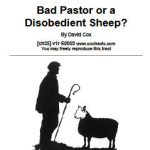ch092 The False Prophet’s Spectacles is an examination of the unbiblical methods a false prophet uses to attract new people to his church.
The False Prophet’s Spectacles
By David R. Cox
[ch92] v1 ©2024 www.coxtracts.com
This tract can be freely reproduced for non-profit purposes
Matthew 7:15 Beware of false prophets, which come to you in sheep’s clothing, but inwardly they are ravening wolves. 20 Wherefore by their fruits ye shall know them. 21 Not every one that saith unto me, Lord, Lord, shall enter into the kingdom of heaven; but he that doeth the will of my Father which is in heaven. 22 Many will say to me in that day, Lord, Lord, have we not prophesied in thy name? and in thy name have cast out devils? and in thy name done many wonderful works.
Matthew 24:11 And many false prophets shall rise and shall deceive many. 24 For there shall arise false Christs, and false prophets, and shall shew great signs and wonders; insomuch that, if it were possible, they shall deceive the very elect.
So, why would a saved person support such ministries?
These false prophets made many supernatural shows in the name of Jesus. One of the marks that Jesus gave us to discern the false prophet is that they prefer making shows to identify themselves as being truly of God. Jesus declared something that was a strong shock, “I never knew you.” We must meditate on this. There are ministers and churches where those in control, that is, those who preach and teach in such a “ministry” are not even saved. So, why does a saved person have anything to do with them?
What is the Declaration of the Gospel?
Ephesians 2:17 And came and preached peace to you which were afar off, and to them that were nigh.
We must understand what the gospel is, and how we are to treat it in terms of what we say to others regarding salvation. There is a lot of importance in this. I mean, if you don’t understand what the gospel is, what salvation is and how you obtain it, you will never be able to enter it, nor will you treat it well.
A False Prophet does not explain the Gospel very well. A good pastor must explain salvation constantly and with different presentations. For the false prophet, the gospel is the repetition of magic words that if you repeat them, you will be saved. In areas of Catholic cultures, they must dip people in baptismal water (water baptism does not save anyone), but that is what the Catholic Church teaches. A preacher faithful to God will explain the gospel many times with clarity and care so that people understand salvation. Just saying or repeating a few words will not save anyone. Salvation comes when one hears the gospel and understands it, but the point of being saved is when the person believes in the gospel, his life changes and he is born again.
The World is Given over to Riches
The world is crazy in its desire for economic gain. The gospel is a spiritual orientation to remove the desire for material things. In other words, we begin with sin. We are in error, because we exalt riches to be our god. But our problems go beyond that. When a church or ministry attracts people through its economic giving of gifts, it is not right.
Genesis 3:1 Now the serpent was more subtil than any beast of the field which the LORD God had made. And he said unto the woman, Yea, hath God said, Ye shall not eat of every tree of the garden,
Matthew 4:3 And when the tempter came to him, he said, If thou be the Son of God, command that these stones be made bread. 4 But he answered and said, It is written, Man shall not live by bread alone, but by every word that proceedeth out of the mouth of God.
God declares that human needs (and desires) should not dictate how you live your life. It is a deception of Satan that you always have economic gain.
Fasting is exactly a spiritual activity to prove to the person himself that his spirit can dominate his body. But people can’t seem to live without exalting economic gain above everything else. Jesus said several times that we will always have the poor with us (Mark 14:7; John 12:8) and in Deuteronomy 15:11 He commands us to “Thou shalt open thine hand wide unto thy brother, to thy poor, and to thy needy.” We are to be generous to those in need. 1 John 3:17 But if anyone has the world’s goods, and sees his brother in need, and closes his heart against him, how does the love of God abide in him?
But there is a type of people who always have their hand outstretched, and they are not actually saved, and God’s work cannot be done with such types. But the false prophet uses people and finds it useful to give gifts to people who are greedy in order add them and better control them.
John 6:26 Jesus answered them and said, Verily, verily, I say unto you, Ye seek me, not because ye saw the miracles, but because ye did eat of the loaves, and were filled. 27 Labour not for the meat which perisheth, but for that meat which endureth unto everlasting life, which the Son of man shall give unto you: for him hath God the Father sealed. 28 Then said they unto him, What shall we do, that we might work the works of God? 29 Jesus answered and said unto them, This is the work of God, that ye believe on him whom he hath sent.
Salvation involves a spiritual change in the person’s being in which he leaves the importance of the earthly and the temporal in order to obtain the spiritual. We must live every moment of every day trying to please God. And this means working to sustain ourselves.
2 Thessalonians 3:10 For even when we were with you, this we commanded you, that if any would not work, neither should he eat.
So, our charity to these people must be limited lest we aid people in their sin, but it is totally a sin and the wrong way to live if one always seeks for “a handout.”
Jesus lamented that they would always follow whoever was giving handouts. These followers are not saved but are looking for the handout. They are children of Satan. Satan only has this world, that he has corrupted. He can only bribe people into his realm based on corrupted earthly things. The children of God have heaven and their future in it, blessings without number.
But a child of Satan habitually focuses on what he is going to enjoy now and in this life. Nothing else matters to him.
Romans 12:2 And be not conformed to this world: but be ye transformed by the renewing of your mind, that ye may prove what is that good, and acceptable, and perfect, will of God.
Luke 12:15 And he said unto them, Take heed, and beware of covetousness: for a man’s life consisteth not in the abundance of the things which he possesseth. 16 And he spake a parable unto them, saying, The ground of a certain rich man brought forth plentifully: 17 And he thought within himself, saying, What shall I do, because I have no room where to bestow my fruits? 18 And he said, This will I do: I will pull down my barns, and build greater; and there will I bestow all my fruits and my goods. 19 And I will say to my soul, Soul, thou hast much goods laid up for many years; take thine ease, eat, drink, and be merry. 20 But God said unto him, Thou fool, this night thy soul shall be required of thee: then whose shall those things be, which thou hast provided? 21 So is he that layeth up treasure for himself, and is not rich toward God.
The true Christian has changed their way of thinking. They esteem and value what is spiritual, and the rewards in heaven are more important than anything the earth has to offer.
Judas Iscariot followed Jesus also and he when to hell anyway
John 12:6 This he said, not that he cared for the poor; but because he was a thief, and had the bag, and bare what was put therein.
[literally “bare away” as in carry off the money]
What we must notice is that for some, money and what is economically convenient for them is more important than anything else, and so their god is wealth. In other words, one’s financial well-being controls the decisions of one’s life. Because of this detail, God commands us to give offerings. God commands every believer, every follower of Him, to give spiritual sacrifices of their possessions for His work. There is another important point. How much does a Christian sacrifice of his own life to show God that wealth is not his god?
Matthew 6:24 No man can serve two masters: for either he will hate the one and love the other; or else he will hold to the one, and despise the other. Ye cannot serve God and mammon.
Likewise, sacrifice, prayer, and meditation must be done so that this sacrifice does not go to a false prophet. But the point we see today is when a ministry attracts people through this greedy desire among the people, how can anything good come out of it? We are part of the “ministry” of the false prophet by attending, supporting him, going for what he gives away, or directing others to him. It is worse when you give money to the falsehood he represents.
The False Prophet uses Avarice[1]
[1] Immoderate desire for wealth; cupidity. An excessive or inordinate desire of gain; greediness for wealth; covetousness; An inordinate desire for some supposed good.
2 Peter 2:3 And through covetousness shall they with feigned words make merchandise of you: whose judgment now of a long time lingereth not, and their damnation slumbereth not.
The matter here is not just that the false prophets are covetous, but they use the covetousness of people to deceive them and to entrap them in webs of wickedness.
2 Peter 2:14 Having eyes full of adultery, and that cannot cease from sin; beguiling unstable souls: an heart they have exercised with covetous practices; cursed children: 15 Which have forsaken the right way, and are gone astray, following the way of Balaam the son of Bosor, who loved the wages of unrighteousness;
We have to understand the economic motive in ministries that give away free things in order to attract people. On the one hand, they give away things in order “build their ministry.” But to appear like a great spiritual success (because the economic attraction is what is actually happening here), they use this to raise funds from Christians that believe their lies of success. In other words, they use numbers to promote themselves.
There is no Real Repentance in Their Ministry
Jeremiah 8:4 Moreover thou shalt say unto them, Thus saith the LORD; Shall they fall, and not arise? shall he turn away, and not return? 5 Why then is this people of Jerusalem slidden back by a perpetual backsliding? they hold fast deceit, they refuse to return. 6 I hearkened and heard, but they spake not aright: no man repented him of his wickedness, saying, What have I done? every one turned to his course, as the horse rusheth into the battle.
These false prophets do not preach the whole counsel of God (Acts 20:27), because it is not convenient for them. They want a great number of people (that will provide them with money, luxuries, fame, and control of their people), and whatever hard thing that should be preached or that might turn away some of their crowds is avoided. When the false prophets have control over many people, they reach their goals. They are embarrassed when people have spiritual problems, and they don’t deal with that kind of thing.
Ezekiel 34:2 Son of man, prophesy against the shepherds of Israel, prophesy, and say unto them, Thus saith the Lord GOD unto the shepherds; Woe be to the shepherds of Israel that do feed themselves! should not the shepherds feed the flocks? 3 Ye eat the fat, and ye clothe you with the wool, ye kill them that are fed: but ye feed not the flock.
(To feed is to remedy their spiritual problems.) God used the prophet Ezekiel to get their attention and to instruct us as well. If a church comes to have thousands of members, how can it care for them individually?
Miracles and Healings
John 6:2 And a great multitude followed him, because they saw his miracles which he did on them that were diseased.
But we observe and analyze what people are like, and what is it that pleases God? The world lives looking at the earthly and as if it is the most important thing here on earth now. In other words, God warns us many times that our sin brings eternal and earthly consequences, and death. Then, God warns us with an illness that our sins will cause us to die. We have limited time to fix our lives. But few are those who use this time for their eternal good. It is the judgment of God that will fall upon one at any moment, and it is certain that it will fall. The false prophet identifies himself with saying good words instead of rebuke when the judgment of God is about to come.
Jeremiah 23:17 They say still unto them that despise me, The LORD hath said, Ye shall have peace; and they say unto every one that walketh after the imagination of his own heart, No evil shall come upon you.
The false prophets do not preach strongly, but only want to appear as if they do. They do not preach towards moral change in their people so that they imitate the moral character of God. It would ruin their goals of success if they did.
Elijah and the Prophets of Baal Wasn’t it sensationalism what Elijah did?
In 1 Kings 18, Elijah went “toe to toe” with the prophets of Baal.
1 Kings 18:33… Fill four barrels with water, and pour it on the burnt sacrifice, and on the wood. 34 And he said, Do it the second time. And they did it the second time. And he said, Do it the third time. And they did it the third time. 38 Then the fire of the LORD fell, and consumed the burnt sacrifice, and the wood, and the stones, and the dust, and licked up the water that was in the trench.
There are some that would say that Elijah fought against the false prophets of Baal, and by this, they also put an axe against physically destroying the icons of false religions. But if we examine the Bible, Elijah did not destroy any idols. He prayed, and God did a miracle that they couldn’t do.
They caused Harm to the Gospel
2 Peter 2:2 And many shall follow their pernicious ways; by reason of whom the way of truth shall be evil spoken of.
Because the truly saved support the ministries of these false prophets, the world thinks that all Christians are like this, and it is not true.
Download
ch092-cox-Spectacles-of-the-False-Prophet-v1.1 (2234 downloads )








